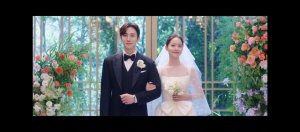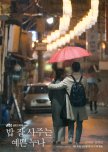Slow but beautiful and I would rather say it's the king of slow burn....
Review: Something in the Rain
"Something in the Rain" (2018), also known as "Pretty Noona Who Buys Me Food", is a romantic melodrama directed by Ahn Pan-seok and written by Kim Eun. It stars Son Ye-jin and Jung Hae-in in a tender story of love, societal judgment, and self-discovery. Praised for its realistic portrayal of relationships, the drama takes viewers on a nuanced journey through modern romance, breaking away from the clichés often found in similar narratives.
Plot Summary
The story revolves around Yoon Jin-ah (Son Ye-jin), a successful yet unfulfilled woman in her mid-30s, who works as a supervisor in a coffee franchise company. She reconnects with Seo Joon-hee (Jung Hae-in), her best friend's younger brother, after he returns to Korea from working abroad. Their casual friendship blossoms into a romantic relationship, one that forces them to confront societal judgments, familial disapproval, and personal insecurities.
The drama explores a myriad of themes, including age-gap romance, gender inequality in the workplace, familial obligations, and the challenges of societal expectations, all woven into a deeply emotional narrative.
---
Strengths
1. Authentic Romance and Chemistry
The heart of Something in the Rain lies in its portrayal of love. Yoon Jin-ah and Seo Joon-hee's relationship feels refreshingly authentic, marked by tender moments, playful banter, and emotional vulnerability. Son Ye-jin and Jung Hae-in deliver standout performances, capturing the nuances of falling in love—the hesitations, excitement, and fears. Their chemistry is palpable, elevating the narrative into a heartfelt experience.
2. Realistic and Relatable Themes
The drama excels in exploring issues beyond romance. Jin-ah’s workplace challenges, including sexual harassment and gender inequality, are portrayed with raw honesty. The cultural pressures on women to conform to traditional roles—such as marrying by a certain age—resonate strongly. Joon-hee's perspective on love, individuality, and defying norms adds depth to his character, making their struggles feel universal yet deeply personal.
3. Cinematography and Aesthetic Appeal
Director Ahn Pan-seok's attention to detail shines through in the drama's subdued yet visually stunning cinematography. The frequent use of natural lighting, muted color tones, and minimalist settings enhances the emotional undertones of the story. Quiet moments, such as the couple walking in the rain or sharing meals, feel poetic and intimate.
4. Exceptional Soundtrack
The OST plays a significant role in heightening the drama's emotional impact. Tracks like “Stand By Your Man” by Carla Bruni and “Save the Last Dance for Me” evoke nostalgia and complement the mood of the narrative. The music not only sets the tone but also becomes a character in itself, accentuating key moments of the couple’s journey.
---
Weaknesses
1. Pacing Issues
The drama’s slow pacing, especially in the latter half, detracts from its otherwise compelling narrative. The repetition of conflicts—particularly the resistance from Jin-ah’s family and societal disapproval—feels dragged out and could have been resolved more succinctly. This stagnation somewhat diminishes the emotional engagement toward the end.
2. Underwhelming Secondary Plotlines
While the main love story is deeply engaging, some of the side plots—like Jin-ah’s struggles at work or her complex relationship with her mother—feel underdeveloped. These storylines initially promise significant commentary on societal issues but fail to deliver meaningful resolutions, leaving viewers wanting more depth.
3. Cultural and Generational Gaps
For international viewers unfamiliar with Korean societal norms, certain conflicts may seem exaggerated, such as the emphasis on age differences and familial approval. While these elements are crucial in Korean culture, they may not resonate as strongly with global audiences.
---
Themes and Symbolism
1. Rain as a Metaphor
Rain appears frequently throughout the drama, symbolizing both cleansing and renewal. It often coincides with moments of emotional revelation or growth, serving as a subtle metaphor for the couple's journey through challenges and eventual healing.
2. Societal Expectations vs. Personal Happiness
The central conflict revolves around the characters’ struggle to prioritize their love over societal norms. Jin-ah, in particular, faces immense pressure from her family to marry someone of a similar age and social standing. This theme resonates deeply in cultures where societal expectations weigh heavily on personal choices.
3. Feminism and Workplace Dynamics
Through Jin-ah’s workplace experiences, the drama critiques the prevalence of harassment and sexism in corporate environments. Her journey toward standing up for herself is both empowering and heartbreaking, highlighting the importance of systemic change.
---
Performances
Son Ye-jin as Yoon Jin-ah: Son Ye-jin delivers a masterclass in subtlety, portraying Jin-ah with grace and vulnerability. Her internal conflicts—balancing her love for Joon-hee with her fear of societal judgment—are palpable and relatable.
Jung Hae-in as Seo Joon-hee: Jung Hae-in’s portrayal of Joon-hee is equally compelling. He brings warmth, charm, and quiet strength to his character, making him an ideal counterpart to Jin-ah’s emotional turmoil. His ability to convey profound emotions with minimal dialogue is particularly noteworthy.
---
Final Thoughts
"Something in the Rain" is more than just a romance drama; it is a poignant exploration of love in the face of societal constraints. It succeeds in capturing the beauty and challenges of relationships with sincerity, bolstered by outstanding performances and thoughtful direction. While its pacing issues and underdeveloped subplots may detract slightly from the experience, the drama’s emotional resonance and relatable themes make it a standout entry in the genre.
Rating: 9.5/10
Fans of slow-burn romances and introspective storytelling will find Something in the Rain a deeply moving and worthwhile watch.
"Something in the Rain" (2018), also known as "Pretty Noona Who Buys Me Food", is a romantic melodrama directed by Ahn Pan-seok and written by Kim Eun. It stars Son Ye-jin and Jung Hae-in in a tender story of love, societal judgment, and self-discovery. Praised for its realistic portrayal of relationships, the drama takes viewers on a nuanced journey through modern romance, breaking away from the clichés often found in similar narratives.
Plot Summary
The story revolves around Yoon Jin-ah (Son Ye-jin), a successful yet unfulfilled woman in her mid-30s, who works as a supervisor in a coffee franchise company. She reconnects with Seo Joon-hee (Jung Hae-in), her best friend's younger brother, after he returns to Korea from working abroad. Their casual friendship blossoms into a romantic relationship, one that forces them to confront societal judgments, familial disapproval, and personal insecurities.
The drama explores a myriad of themes, including age-gap romance, gender inequality in the workplace, familial obligations, and the challenges of societal expectations, all woven into a deeply emotional narrative.
---
Strengths
1. Authentic Romance and Chemistry
The heart of Something in the Rain lies in its portrayal of love. Yoon Jin-ah and Seo Joon-hee's relationship feels refreshingly authentic, marked by tender moments, playful banter, and emotional vulnerability. Son Ye-jin and Jung Hae-in deliver standout performances, capturing the nuances of falling in love—the hesitations, excitement, and fears. Their chemistry is palpable, elevating the narrative into a heartfelt experience.
2. Realistic and Relatable Themes
The drama excels in exploring issues beyond romance. Jin-ah’s workplace challenges, including sexual harassment and gender inequality, are portrayed with raw honesty. The cultural pressures on women to conform to traditional roles—such as marrying by a certain age—resonate strongly. Joon-hee's perspective on love, individuality, and defying norms adds depth to his character, making their struggles feel universal yet deeply personal.
3. Cinematography and Aesthetic Appeal
Director Ahn Pan-seok's attention to detail shines through in the drama's subdued yet visually stunning cinematography. The frequent use of natural lighting, muted color tones, and minimalist settings enhances the emotional undertones of the story. Quiet moments, such as the couple walking in the rain or sharing meals, feel poetic and intimate.
4. Exceptional Soundtrack
The OST plays a significant role in heightening the drama's emotional impact. Tracks like “Stand By Your Man” by Carla Bruni and “Save the Last Dance for Me” evoke nostalgia and complement the mood of the narrative. The music not only sets the tone but also becomes a character in itself, accentuating key moments of the couple’s journey.
---
Weaknesses
1. Pacing Issues
The drama’s slow pacing, especially in the latter half, detracts from its otherwise compelling narrative. The repetition of conflicts—particularly the resistance from Jin-ah’s family and societal disapproval—feels dragged out and could have been resolved more succinctly. This stagnation somewhat diminishes the emotional engagement toward the end.
2. Underwhelming Secondary Plotlines
While the main love story is deeply engaging, some of the side plots—like Jin-ah’s struggles at work or her complex relationship with her mother—feel underdeveloped. These storylines initially promise significant commentary on societal issues but fail to deliver meaningful resolutions, leaving viewers wanting more depth.
3. Cultural and Generational Gaps
For international viewers unfamiliar with Korean societal norms, certain conflicts may seem exaggerated, such as the emphasis on age differences and familial approval. While these elements are crucial in Korean culture, they may not resonate as strongly with global audiences.
---
Themes and Symbolism
1. Rain as a Metaphor
Rain appears frequently throughout the drama, symbolizing both cleansing and renewal. It often coincides with moments of emotional revelation or growth, serving as a subtle metaphor for the couple's journey through challenges and eventual healing.
2. Societal Expectations vs. Personal Happiness
The central conflict revolves around the characters’ struggle to prioritize their love over societal norms. Jin-ah, in particular, faces immense pressure from her family to marry someone of a similar age and social standing. This theme resonates deeply in cultures where societal expectations weigh heavily on personal choices.
3. Feminism and Workplace Dynamics
Through Jin-ah’s workplace experiences, the drama critiques the prevalence of harassment and sexism in corporate environments. Her journey toward standing up for herself is both empowering and heartbreaking, highlighting the importance of systemic change.
---
Performances
Son Ye-jin as Yoon Jin-ah: Son Ye-jin delivers a masterclass in subtlety, portraying Jin-ah with grace and vulnerability. Her internal conflicts—balancing her love for Joon-hee with her fear of societal judgment—are palpable and relatable.
Jung Hae-in as Seo Joon-hee: Jung Hae-in’s portrayal of Joon-hee is equally compelling. He brings warmth, charm, and quiet strength to his character, making him an ideal counterpart to Jin-ah’s emotional turmoil. His ability to convey profound emotions with minimal dialogue is particularly noteworthy.
---
Final Thoughts
"Something in the Rain" is more than just a romance drama; it is a poignant exploration of love in the face of societal constraints. It succeeds in capturing the beauty and challenges of relationships with sincerity, bolstered by outstanding performances and thoughtful direction. While its pacing issues and underdeveloped subplots may detract slightly from the experience, the drama’s emotional resonance and relatable themes make it a standout entry in the genre.
Rating: 9.5/10
Fans of slow-burn romances and introspective storytelling will find Something in the Rain a deeply moving and worthwhile watch.
Esta resenha foi útil para você?














